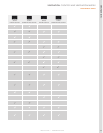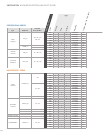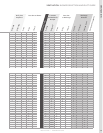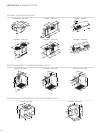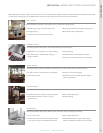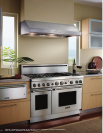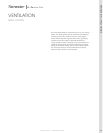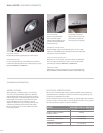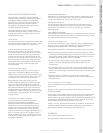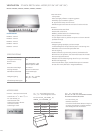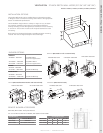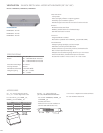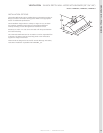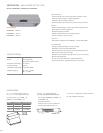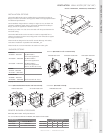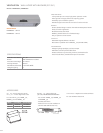
1.800.735.4328 | THERMADOR.COM
Remote Blowers (VTR Series)
Depending on your preference and ducting situation, these blowers can be
mounted on the roof or exterior wall of your home. An exterior installation
may be more appealing to reduce noise in the kitchen.
Inline Blowers (VTI series)
To minimize noise in the kitchen, these blowers are mounted along the
duct line anywhere between the kitchen and the exterior wall. If you have
easy access to your duct line (in an attic, for example), this may be an
appealing option.
Integral Blowers (VTN series)
These blowers are purchased separately and integrated into the hood or onto
the downdraft unit at the time of installation. This option allows you to select
your ideal hood with the exact power you require.
CHOOSINg THE RIgHT CFm
The power of the cooktop or range, measured in BTU, is perhaps the most
important factor in determining CFM needs for a hood. Professional gas
cooktops generally should have 1 CFM for every 100 BTU.
You should also consider the cooking space and cooking style of your client.
• More demanding cooks usually require more exhaust capacity to handle
moisture generated by boiling large pots of water or the grease and smoke
resulting from grilling or frying. This cooking style could require a hood or
downdraft system with airflow of 600 to 1,300 CFM.
• For those who are used to preparing quick meals in a relatively small
kitchen, a hood with 600 CFM may be adequate ventilation for the
cooking space.
• If the cooking surface is in a peninsula or island, a larger capacity hood can
provide better capture when there are cross currents and when the hood
needs to be mounted higher. Downdraft ventilation systems are also a good
alternative.
• High heat cooking or aromatic foods may require additional CFM.
Increasing capture area by 3" on each side is also a recommended way to
address this issue.
LENgTH AND SIzE OF DUCTWORK
Do not use flexible duct; it creates back pressure/air turbulence and reduces
performance.
Straight runs and gradual turns are best. Use the shortest route with the
fewest turns possible.
Proper performance is dependent upon proper ducting. Use a qualified and
trained installer. Local building codes may require the use of make-up air
systems when using ducted ventilation systems greater than specified CFM of
air movement. The specified CFM varies from locale to locale. Consult your
HVAC professional for specific requirements in your area.
If using a 10" duct, Thermador recommends not exceeding 150 feet of duct.
Transitions, elbows and wall or roof caps are all factors that will add more
static pressure, therefore increasing your equivalent duct run.
WARRANTY
Limited warranty parts and labor (1 year)
See page 294 for additional warranty details.
INSTALLATION CONSIDERATIONS
The information in this design guide provides key
features, product dimensions, cutouts and installation
specifications. Before installing a Thermador Wall
Hood, be sure to verify the cutout dimensions and
electrical connections. Also, always consult with
the installation manual packed with the product for
complete details before installing.
Thermador Wall Hoods may be installed above a
Thermador Cooktop or Range to create a convenient
cooking center. Refer to the appropriate section for
additional specifications.
HOOD WIDTH
The hood width should be no less than the width of the
cooking surface. Where space is not restricted, a wider
hood can be used to increase your capture area.
DISTANCE FROm COOKINg SURFACE
Proper mounting height is very important. If a hood
is mounted too low, it may be difficult to cook and be
unsafe. If a hood is mounted too high, performance
may be compromised. For optimal performance, the
distance from the cooking surface to the bottom of the
hood should be a minimum of 30", unless otherwise
noted. Please refer to the installation manual for each
hood and cooktop/range model for proper hood
mounting heights.
AVAILABLE CEILINg HEIgHT
The standard ceiling height can vary from region to
region and in homes built in different eras. Ceiling
heights, even in the same room, can sometimes vary by
as much as several inches. Kitchen ceiling heights can
vary between 7'6" (or 90") to over 10' (or 120").
Before selecting a Thermador Hood, check the
available installation space and any extra space that
may remain after proper installation of a hood and
cooktop or range. This extra space can be filled using
Thermador’s stainless steel duct cover accessories or
integrated with kitchen cabinetry. The space can also
be adjusted by raising or lowering your hood within the
recommended range (typically 30" to 36" above the
cooking surface).
CHOOSINg THE CORRECT BLOWER
A variety of interior and exterior blower options
(Remote, Inline or Integral) are available for
Thermador’s Professional and Masterpiece® Series
Hoods. If the unit you have selected does not have
a blower, one can be purchased separately. Blower
selection will vary based on the volume of air that
needs to be moved and the length and location of the
duct run. For long duct runs with multiple turns and
bends, consider using a more powerful blower. For the
most efficient air flow exhaust, use a straight run or as
few elbows as possible.
VENTILATION — WALL HOODS
WALL HOODS PLANNINg INFORmATION
145



